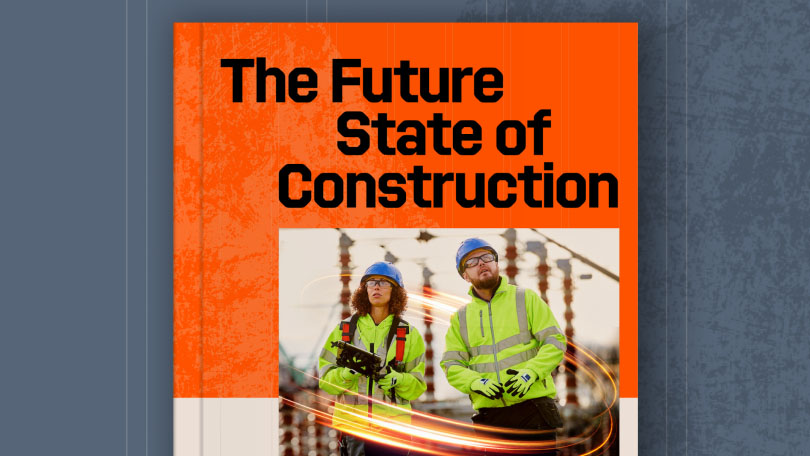— 13 min read
Understanding Construction Contracts

Last Updated Aug 28, 2025

Nicholas Dunbar
Content Manager
65 articles
Nick Dunbar oversees the creation and management of UK and Ireland educational content at Procore. Previously, he worked as a sustainability writer at the Building Research Establishment and served as a sustainability consultant within the built environment sector. Nick holds degrees in industrial sustainability and environmental sciences and lives in Camden, London.
Last Updated Aug 28, 2025

Choosing the right construction contract is just as important as laying a solid foundation. Whether you're a contractor, project manager, client or property developer, understanding the various types of construction contracts is central to a project’s success.
Here, we show you the main contract types used in the UK construction industry to help you understand the different types of building and construction contracts.
Table of contents
Key Elements of a Construction Contract
A construction contract is only as strong as the clauses it contains. While the exact wording will vary by project, UK law and industry best practice suggest the following components as non-negotiable:
- Scope of work: A clear description of what is - and is not - included. Ambiguity here is the root cause of most disputes.
- Contract sum & pricing mechanism: Whether lump-sum, re-measurement or cost-plus, the basis for calculating payment must be explicit.
- Payment terms: Frequency, valuation method (e.g., interim certificates) and any retention percentages, all aligned with the Housing Grants, Construction and Regeneration Act 1996 (as amended).
- Quality standards: Referenced specifications, workmanship levels and testing regimes to prove compliance.
- Change management: A formal variation procedure covering instruction format, pricing and programme impact.
- Risk allocation: Who carries design risk, ground-condition risk, inflation risk, etc., often expressed through indemnities or caps.
- Dispute resolution: Step-down ladder: negotiation → adjudication (28-day under the Scheme) → arbitration/litigation.
- Termination & suspension: Events that give either party the right to walk away and the financial consequences that follow.
- Insurance & bonds: Minimum cover levels, insurers’ ratings and required surety instruments (performance bond, parent-company guarantee).
Risk and Construction Contracts
Construction is, by nature, a risk-heavy business. A well-drafted contract clarifies who shoulders which risks so surprises don’t become lawsuits. Below are the headline categories you should spell out, followed by how the common contract types shift the burden.
What “Risk Allocation” Means
Risk allocation is the contractual assignment of financial or time-related consequences if something goes wrong. Typical buckets include:
- Cost overruns (labour, plant, inflation)
- Programme delays (weather, late information)
- Unforeseen site conditions (contaminated soil, buried services)
- Design errors or scope creep
- Force-majeure events (strikes, pandemics)
How Different Contracts Handle Risk
- Lump Sum (Fixed Price): Contractor carries most cost risk. If steel prices jump after signing, the contractor absorbs it unless a fluctuation clause is built in.
- Cost-Plus: Client carries cost and quantity risk; contractor’s exposure is limited to agreed overhead & fee. Ideal where scope is fluid or unknown conditions are likely.
- Guaranteed Maximum Price (GMP): Hybrid. Contractor prices on a cost-plus basis but caps the total. Overruns above the cap fall to the contractor, incentivising efficient delivery.
- Time & Materials: Client bears both price and productivity risk; works when urgent mobilisation outweighs budget certainty.
- NEC Option C (Target Cost): Parties share pain/gain against an agreed target cost, promoting collaboration on value engineering.
- JCT Design & Build: Design responsibility (and resulting errors) sits with the contractor, while unforeseen ground conditions typically remain with the employer unless amended.
Why Explicit Contract Wording Matters
Vague risk clauses invite dispute adjudications and eat contingency budgets. Precise allocation:
- Protects margins by letting each party price known risks accurately.
- Reduces claim cycles and project delays.
- Provides lenders and insurers with the certainty they require to release funds.
Pro Tip
Include an early-warning or change-control procedure (NEC-style) so emerging risks are flagged and costed before they snowball.
Contract Documents: Beyond the Agreement
A construction “contract” is rarely a single sheet of paper; it’s a bundle of inter-locking documents that together form the legal framework for the job. If one piece is missing or contradictory, disputes follow. At a minimum, expect:
- Main Agreement: The executed form that names the parties, contract sum and key dates.
- General Conditions: Standard clauses covering payment, variations, insurance, termination and dispute resolution (e.g., JCT SBC Conditions 2016).
- Project-Specific Conditions: Amendments or Z-clauses that override the standard wording to reflect unique risks.
- Scope & Specifications: Written descriptions of materials, workmanship standards and performance criteria.
- Drawings: Plans, elevations and details that visually define the works; latest revision always governs.
- Schedules & Bills: Programme, bill of quantities, pricing schedules or activity schedules that quantify time and money.
- Ancillary Documents: Design responsibility matrices, warranties, bonds, and insurance certificates.
Keep these aligned - if the drawings change, the specification and bill should update too - so the contractual jigsaw still fits.
Legal & Regulatory Context
Every UK construction contract sits against a statutory backdrop that cannot be signed away. The cornerstone is the Housing Grants, Construction and Regeneration Act 1996 (HGCRA), often called the “Construction Act.” Introduced to improve cash-flow and reduce disputes in an industry notorious for both, the Act gives parties two fundamental rights: regular, predictable payments and a fast-track adjudication forum if those payments stall.
Under the Act, every contract must contain an adequate mechanism for determining when interim payments become due and the final date for payment. It also obliges the paying party to issue timely payment or pay-less notices. Failure to do so triggers a so-called “smash-and-grab” scenario in which the amount applied for becomes payable in full. The statute therefore rewards diligent administration and penalises silence, reinforcing the need for robust document management software.
Equally significant is the statutory right to adjudicate “at any time.” This 28-day dispute-resolution process was designed to keep projects moving while arguments are settled by an independent adjudicator rather than a lengthy court action. Because adjudication decisions are binding unless and until a court or arbitrator rules otherwise, parties must be prepared to present coherent evidence - another reason clear contract documentation is essential.
Where a written contract omits any of these mandatory payment or adjudication provisions, the Scheme for Construction Contracts steps in by default. The Scheme supplies a complete set of terms - covering valuation intervals, notice deadlines and the adjudication timetable - that automatically override conflicting or missing clauses. In practice, most modern standard forms (JCT 2016, NEC 4, etc.) build the Act and the Scheme into their general conditions, but bespoke amendments can still create gaps that the Scheme must plug.
Other legislation, such as the Construction (Design and Management) Regulations 2015 and the Building Safety Act 2022, imposes parallel duties around health, safety and residential building control.
Common Exclusions & Contingencies
Even the most comprehensive form contract leaves certain items outside the price so that parties can compare bids on a like-for-like basis.
Planning and building-control permits, for example, are frequently excluded because their fees vary by postcode and local-authority processing times. Consultant costs - structural engineers, party-wall surveyors, acoustic specialists - also tend to sit outside the construction sum; the employer appoints and pays them directly so their professional duties remain clear.
A third recurring omission is the identification and removal of hazardous materials. Contractors usually assume the site is clean unless the tender documents alert them to asbestos, contaminated soil or unexploded ordnance. If those risks surface later, they trigger a formal change order and a re-priced programme.
To guard against the financial shock of such surprises, contracts often carry a contingency allowance. Unlike profit or overhead, contingency is a ring-fenced pot that may be spent only with the employer’s approval when genuinely unforeseen conditions arise.
On a lump-sum job the contingency sits inside the fixed price and is managed by the contractor; on a cost-plus or GMP project it is more common for the employer to retain the contingency as a separate budget line.
Either way, the principle is the same: acknowledge that unknowns exist and price them transparently rather than burying them in speculative mark-ups.
Standard Form Contracts
Standard form contracts are pre-established templates widely used in construction. They offer a familiar framework that many in the industry understand and aim to save time while reducing the risk of misunderstandings. There are two main families of standard form contracts:
JCT (Joint Contracts Tribunal) Contracts
JCT contracts are the most commonly used in the UK, especially for building projects. They come in several forms, each designed for different project needs:
Standard building contract. The standard building contract is intended for larger, more complex projects where detailed contract provisions are necessary. It's typically used when the employer provides the design, and the contractor is responsible for carrying out the work.
For example, if you're constructing a large office building with specific architectural designs provided by the client, this contract would be suitable. It allows for clear delineation of responsibilities and risk allocation between the parties involved.
Design and build contract. As the name suggests, a design and build contract is used when the contractor is responsible for both design and construction. It's suitable for projects requiring detailed provisions but where the client wants a single point of responsibility.
This type of contract might be used for a new housing development where the contractor is tasked with both designing and building the homes. It simplifies the process for the client but requires the contractor to have both design and construction capabilities.
Minor works building contract. For smaller, simpler construction projects, the minor works building contract is often the best fit. It's used when the work isn't complex and doesn't require detailed contract provisions.
You might find a minor works and building contract appropriate for something like a small house extension or a simple retail fit-out. It streamlines the contractual process for straightforward projects.
Intermediate building contract. Typically bridges the gap between minor works and standard building contracts, the intermediate building contract is often used for projects up to one million pounds.
An intermediate building contract might be suitable for a medium-sized residential development or a moderately complex commercial renovation. With it, you get more detail than a minor works contract, though it’s not as comprehensive as the standard building contract.
Construction management contract. When a client wants to appoint a construction manager to oversee the project, this is usually the contract of choice. The construction manager coordinates the work of various trade contractors, who are directly contracted to the client.
This type of contract is often used for large, complex projects where the client wants more control and flexibility. For instance, it might be used in the construction of a large shopping centre or a multi-use development.
Learn about the future of the built environment - Read Procore's Future State of Construction report
Learn how contractors, subcontractors, and project teams can take advantage of new opportunities to boost efficiency and profitability over the next decade. Download the report to get your roadmap to the future state of construction.

NEC (New Engineering Contract) Contracts
NEC contracts are more commonly used for engineering projects and public sector work. They can be used internationally and are known for their flexibility. The NEC suite includes several contract options, each designed for different project types and risk allocations.
NEC contracts are often preferred for their clear language and proactive approach to project management. They're designed with good project management practices and collaboration between parties in mind.
You might see a NEC contract used for large infrastructure projects like railways or bridges. They're favoured for their emphasis on early warning systems and collaborative problem-solving, helping to keep complex projects on track.
Other Contract Types
Beyond the standard form contracts, several other types are also used in UK construction:
Lump Sum (Fixed Price) Contracts
Lump sum contracts are also known as fixed price contracts and are the most popular type for building and engineering agreements. In this arrangement, the contractor agrees to a fixed price for the entire project.
They provide cost certainty. However, they require accurate cost estimation by contractors, who bear the risk of cost overruns. Lump sum contracts work well for projects with a well-defined scope and low risk of changes.
For example, a lump sum contract might be used for the construction of a standard office building where the design and specifications are clearly defined from the outset, or where the contractor has built to a similar design in a previous project.
Cost-plus Contracts
In a cost-plus contract, the owner/client purchases materials and equipment, and the contractor is paid a fixed percentage on top of costs. This type of contract is often used when the owner wants control over material selection or when the project scope is not fully defined at the outset.
Cost-plus contracts provide transparency in project costs and can be beneficial when flexibility is needed. They do, however, require monitoring to prevent cost escalation.
You might see cost-plus contracts used in a high-end residential project where the client wants to select specific materials or in a renovation project where the full scope of work is unclear until work begins.
Time and Materials (T&M) Contracts
In a time and materials contract, the contractor is reimbursed for material costs and paid a fixed wage for labour. It's useful for projects with an uncertain scope.
T&M contracts provide protection for contractors but may limit profit potential. They require careful management and clear communication to prevent cost overruns.
These contracts are often used for maintenance work, emergency repairs or projects where the full scope can't be determined until work is underway. For example, renovating an old building where structural issues may only be discovered once the walls are opened up and require flexibility in the scope of work and budget.
Unit Price Contracts
In a unit price contract, work is divided into fixed-cost units. This type of contract is useful for projects with an uncertain number of repeatable elements. It's also known as measure and pay, measurement, or remeasurement contracts.
Unit price contracts are common in civil engineering projects, such as road construction or pipeline installation, where the quantity of work may vary but the type of work is consistent.
Guaranteed Maximum Price (GMP) Contracts
A guaranteed maximum price contract sets an upper limit for project costs, with the contractor absorbing any additional costs beyond the agreed maximum. You’ll see GMP contracts used for projects with a known scope and challenges.
GMP contracts aim to combine the cost certainty of a lump sum contract with the flexibility of a cost-plus contract. They're often used in commercial construction where the client wants to cap their financial exposure while retaining some flexibility in the project scope.
Integrated Project Delivery (IPD) Contracts
Integrated project delivery is a relatively new approach that involves a multi-party agreement between the design firm, builder and owner. It spreads risk and rewards across all parties and promotes collaboration and innovation.
IPD contracts are gaining popularity for complex projects where early collaboration between all stakeholders can lead to better outcomes. They're often used in healthcare construction or other technically complex buildings.
Choosing the Right Contract
Selecting the appropriate contract type is the starting point for a project’s success. Here are some factors to consider:
- Project size and complexity: Larger, more complex projects typically require more detailed contracts.
- Level of design detail available: If the design is complete, a lump sum contract might be suitable. If the design is evolving, a more flexible contract type could be better.
- Desired risk allocation: Different contract types allocate risk differently between the client and contractor.
- Project timeline and budget constraints: Some contract types are better suited to fast-track projects or tight budgets.
- Level of client involvement required: If the client wants to be heavily involved in decision-making throughout the project, certain contract types will be more appropriate.
While certain contract types are more common for specific project types, the choice ultimately depends on the unique requirements of each project. It's always wise to consult with legal and other construction professionals so you're selecting the most appropriate contract for your specific needs.
The Need for Project Management Software
Managing construction contracts is simpler with the right software. These tools help track project progress while handling documents and keeping everyone in the loop. From scheduling to budget tracking, project management software makes contract administration smoother. Look for options that offer features tailored to construction project management and integrate well with your existing systems.
Want to know more? Read our article about Preventing Construction Disputes with Smart Contract Management
Categories:
Written by

Nicholas Dunbar
Content Manager | Procore
65 articles
Nick Dunbar oversees the creation and management of UK and Ireland educational content at Procore. Previously, he worked as a sustainability writer at the Building Research Establishment and served as a sustainability consultant within the built environment sector. Nick holds degrees in industrial sustainability and environmental sciences and lives in Camden, London.
View profileExplore more helpful resources

Integrated Compliance: A Main Contractor’s Guide to ISO 9001, 14001, 45001, and 44001
For UK main contractors, ISO 9001, 14001, and 45001 are fundamental prerequisites to any tendering activity. The Building Safety Act, Net Zero targets, and tight margins mean these certifications are...

The Main Contractor’s Action Plan for Commercial Risk
For UK main contractors, managing risk protects project margins, rather than solely acting as a compliance exercise. Construction is an industry defined by thin profits and high liability, and a...

Construction Action Plans: Minimising Risk & Maximising Delivery
A construction project is a complex set of tasks, resources, and stakeholders. Without a clear, documented path forward, even meticulous planning can lead to delays, cost overruns, and disputes. The...

Construction Drawings: Guide to Types & Regulations
While architects, urban planners and landscape designers first conceive buildings and public realms in their minds, translating vision into detailed drawings remains the foundation for any project. Construction drawings translate...
